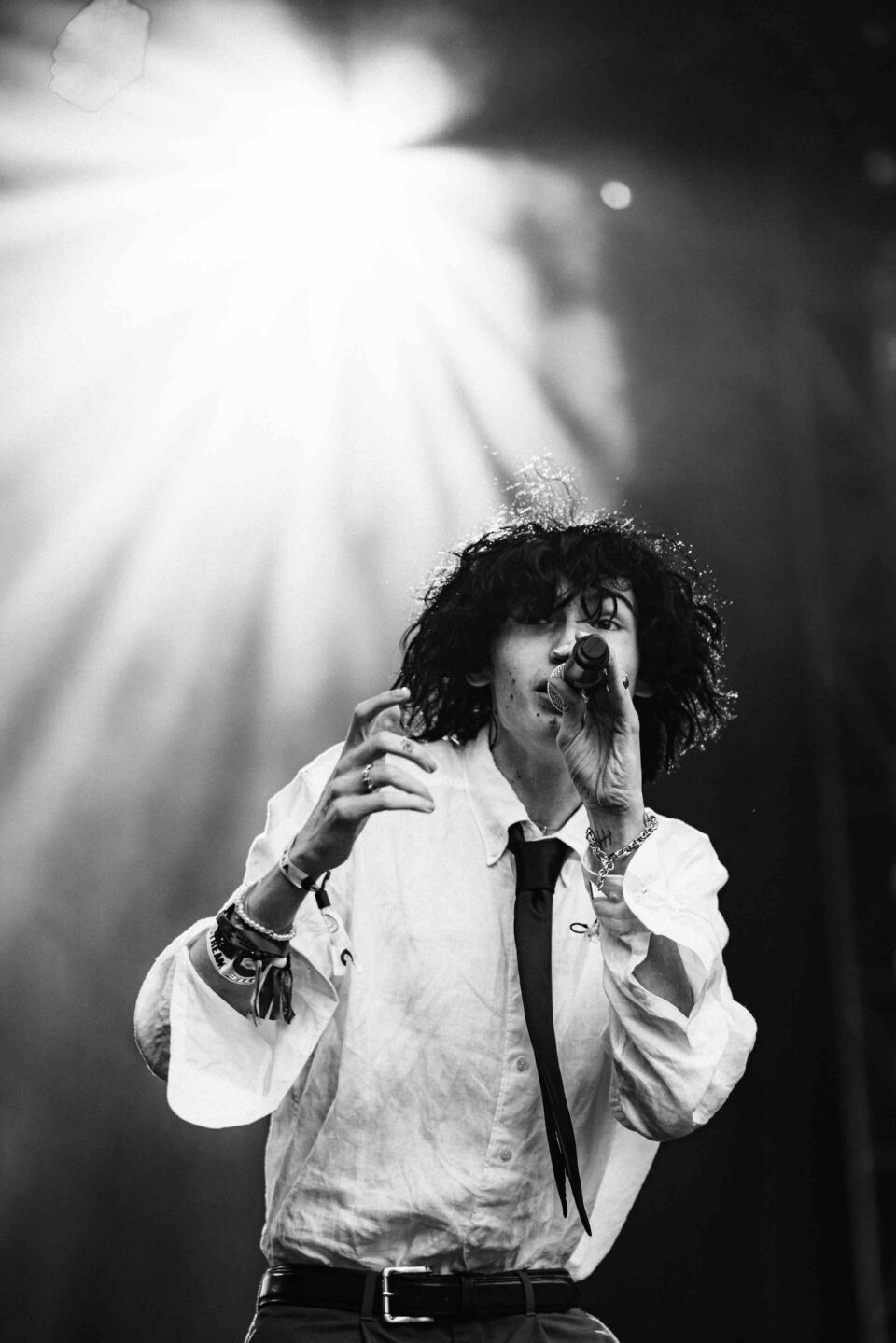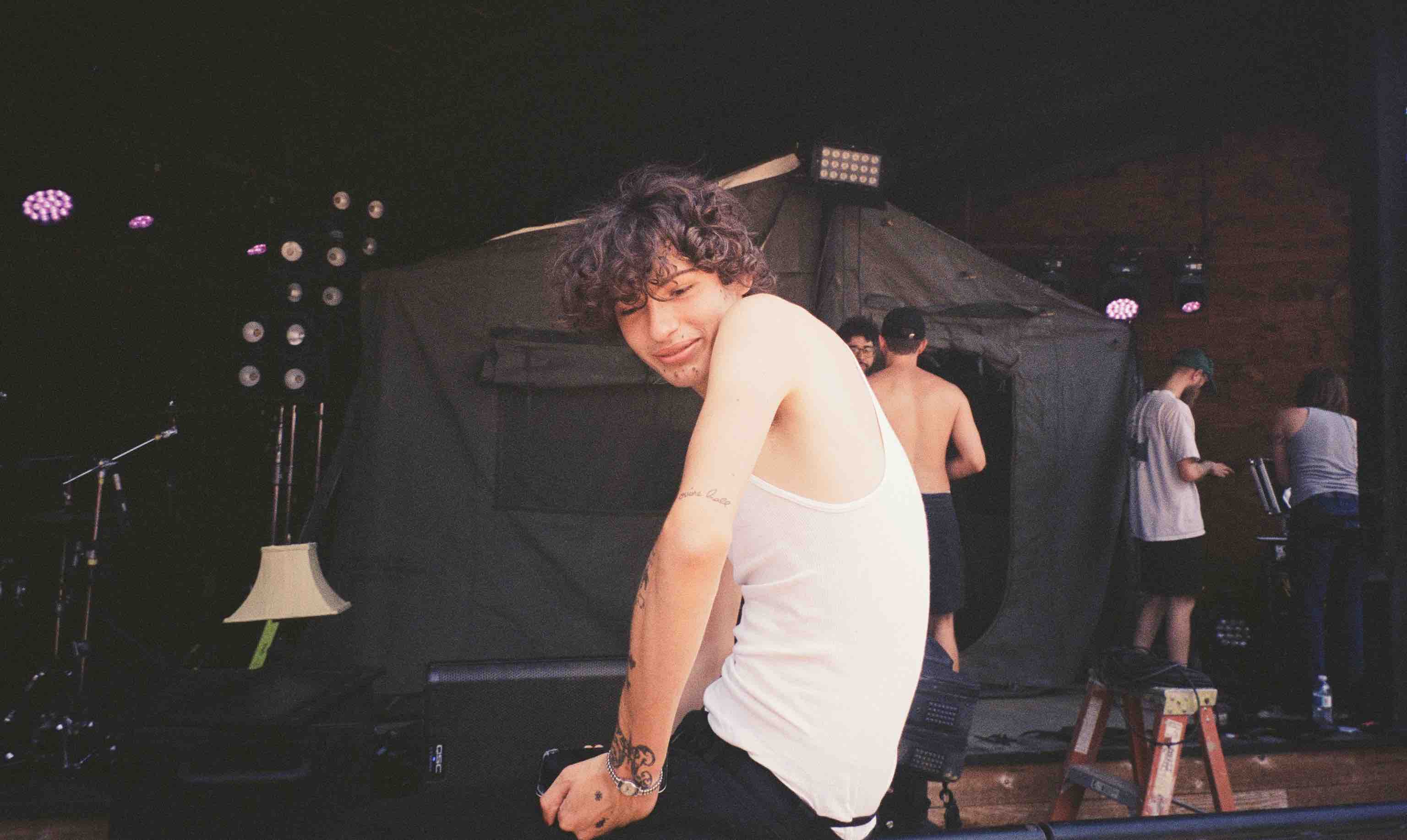It feels odd that glaive’s latest project, i care so much that i dont care at all, is his debut. Semantics regarding EPs versus LPs aside, the artist born Ash Gutierrez in 2005 has been in our lives for what feels like a long time. Perhaps it has something to do with his rapid emergence during the pandemic, soundtracking our collective boredom and terror with maximalist, hyperpop anthems that felt remarkably assured while clearly the work of a young person. Or maybe it’s the sheer mass of work he’s made since he began releasing songs in 2020, which suggests that quantity can confuse our senses.
Part of this, certainly, is due to the lasting impact of his firework pop songs. They take off and rarely lose momentum, with Gutierrez singing of heartbreak and isolation and confusion and not wanting to go outside. He emerged as one of the leading figures of a rapidly expanding scene alongside Jane Remover and ericdoa—artists spread across the country, but intimately related thanks to the limitlessness of Discord servers and online interactions. He quickly gained a following and inked a deal with Interscope, and this early gestation period is what he lovingly calls “Interscope University”—his college years.
i care so much that i dont care at all, then, is his doctorate thesis—both a step up from his early EPs and a refined version of his work prior to those releases. It builds from the early tenets of hyperpop but moves toward rock, rap, electro, and beyond. His lyrics are as personal as ever, but he’s more comfortable in his truth than before. In our conversation, glaive discusses growing up on the internet, trying to be a good person, and keeping things a buck 50.
You basically grew up on the internet. What’s it like now that the album is out IRL, so to speak?
It’s so weird. I didn’t go outside much when I was in North Carolina, which is where I’m from. I was just in my room—playing video games, on Discord, not doing anything. Some of the general things [this album] touches on are what was happening in real life when I was going out for the first time—not going out partying, but being in Los Angeles or New York, or being in any number of the American cities that I’ve been to on tour. It’s fucking crazy. When I was 15, I couldn’t do public speaking at school, I couldn’t hold conversations. I didn’t look people in the eye when I was talking. And now at 18 I can do all those things. I love public speaking—not even just doing music.
“When I was 15, I couldn’t do public speaking at school, I couldn’t hold conversations. I didn’t look people in the eye when I was talking. And now at 18 I can do all those things.”
It’s fair to say that as you’re growing up, the music on this album won’t necessarily mirror the way you’re feeling. How do you deal with that on tour?
I’ve literally thought about that so much. There’s a song called “2005 barbie doll,” and I don’t feel the way that I feel in that song. I kept trying to re-record it, but nothing I was saying felt as honest as the way I felt while writing that song. I’d imagine in a few years I’ll feel that way about all the songs, because—everybody says it, and it’s super cliché, but—there’s a big difference between being 16 and 18, and then 18 and 20.
It sounds like you’re more optimistic now than you were when writing the record.
A hundred percent. It has nothing to do with music—and honestly, maybe it’s bad for the music. All my songs are me when I’m at my most upset and maybe my most pessimistic. I’ve never just made a happy song, because that’s not what I make. I don’t make music when I’m happy. When I’m happy, I go and take a walk outside.

“I’m just trying to connect with my audience while I can, because I’m trying to be Dua Lipa one day. Dua Lipa cannot know everybody at their show’s names.”
It’s interesting that you only do your favorite thing when you’re sad.
I have a good friend named Eric [ericdoa] who I was talking about this with. It’s like, what do you do when you’re not being a musician? What do you do when you’re not making music? I used to just sit there and do nothing and just not be a very happy person. And now it’s like, I’m trying to play tennis—I love tennis, I could talk to you about tennis. Me and Eric are in the same boat. We’re just trying to do normal things and be human, be well-rounded. It does matter a lot. There are so many musicians that I think are great musicians, but are just fucking weird people. My goal is to be a nice guy, hopefully. Not nice—“nice” is a bit of a stretch. But good. No, not “good” either…
Then you go on tour and there are these fans who hang onto your every word and have a much different relationship with it than maybe they should. Is that difficult to deal with?
It’s not difficult at all, it’s just strange. Probably the first and easiest example is when people call me “Ash,” which is not a big thing. You can call me Ash, and I wouldn’t be bothered. But it’s strange to be “Ash” to somebody whose name I don’t know. A lot of artists are like, “You have to call me by my stage name, don’t call me my real name.” I don’t give a fuck. Call me Ash. I honestly would prefer you to call me Ash than glaive, because glaive is a stupid name. I’m just trying to connect with my audience while I can, because I’m trying to be Dua Lipa one day. Dua Lipa cannot know everybody at their show’s names.
It’s part of being a decent guy.
Both in the show and in my personality I want to be myself and be nice to people—because at the end of the day, they’re paying money to see me sing and it just fucking blows my mind. Part of being a decent guy is trying to pay that back in some way, I think. If somebody wants to talk to you about their life, shit, hear them out. That’s what my music is: It’s just me complaining the whole time. So if somebody wants to come up to me and complain, I’m with it. Let’s chop it up. “How do you feel about it?” “What’s your opinion on it?” I’m down for it.
There are a lot of musicians that get really hung up on being cool, or being something they’re not—and a lot of people that pretend to be cool are actually cool. They’re just good at dressing, and they go do all the things that are cool. I don’t care at all. I really—and this sounds super teenage-angsty—but I really don’t care. I just want to be myself.
“That’s what my music is: It’s just me complaining the whole time. So if somebody wants to come up to me and complain, I’m with it. Let’s chop it up.”
Your honesty allows you to relate to your audience more intensely, I think.
I mean, there are definitely things that I keep private. I don’t want to seem like I’m whoring my whole life out for the world. The songs are very honest, and it’s not because I’m trying to make songs that are deeply personal. If I speak for long enough, I will have talked myself into a verbal hole of being very honest. So when people come up and talk to me, I’m going to be fucking very honest because that’s how I speak. I keep it a buck 50. There’s no lying over here. All the songs are 100 percent fucking true.
Is that a goal when you write, or is that just the way it comes out?
Maybe, looking back, I could have figured out a more beautiful way to put it, or a less crude way to put it. I’d like to think, hopefully, that I never will, that I’ll always just be pretty fucking face-value. This is what I’m saying, and this is what I mean. FL







